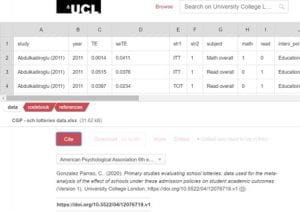Going a Step Further with Research Data: Open Scholarship at UCL
By Nazlin Bhimani, on 17 July 2020
Open Science, Open Research and Open Scholarship are synonyms of a new cross-domain approach to creating, sharing, evaluating, rewarding and curating research and education outputs. ‘Open Scholarship’, the preferred term used at UCL, is underpinned by eight pillars and UCL is seen as a leader in Europe in Open Scholarship undertaking activity in all 8 areas. Its work is formulated in line with the recommendations of the League of European Research Universities or LERU’s Roadmap for Open Science, produced in 2018. The roadmap promised to bring exciting new opportunities for scholars and this blog post is an example of how one researcher has been able to embrace the LERU principle of FAIR data in UCL’s open research environment.
In this post, Dr Constanza Gonzalez Parrao writes about her experience of making her research data openly available in UCL’s Research Data Repository, and how she goes a step further in submitting a ‘data article’ in a peer-reviewed, open access journal.
As PhD students, it is sometimes difficult to increase our publications output and at least for me, the idea of publishing my work was centred on writing research papers only. However, in the last months, I have discovered that the publication road includes a variety of academic “products”, all of which can help to extend our research impact. For me, this process started with an email from Nazlin Bhimani, the IOE’s Research Support & Special Collections Librarian, inviting doctoral students to publish their research data and explore the option of producing an associated “data article”. At that time, I knew little about data articles but I had vaguely discussed with my supervisor the idea of making my data publicly available. I found out that data articles are shorter manuscripts that describe the data used in a research study so that other researchers can become aware of its existence and the potential use and re-use of the data. Data articles also enable us to publish parts of the thesis that would not normally be published in a research article, either due to the word-length limit or because the focus of the article is often not the methodology.
One of the chapters of my thesis is a systematic review of more than a hundred pages long, including the appendices. To conduct a meta-analysis, I created a dataset with information from a group of the primary studies included in the review. This constituted my data, which would have been “forgotten” if I had not taken the opportunity to look at ways to make this part of my research project more visible. After some guidance from Nazlin on the different stages and requirements of the publication process, I was able to structure this long research chapter into three complementary outputs to maximise its visibility: an open access dataset in UCL’s data repository, a data article and a research article in peer-reviewed journals.
UCL promotes Open Science or Open Scholarship and UCL’s research repository was set up to promote open data based on the FAIR principles so that data is Findable, Accessible, Interoperable and Reusable. I decided to publish my data to adhere to these principles, but also because in systematic reviews transparency and reproducibility are required standards. Preparing the dataset was straightforward but I had to make sure that I was explicit about its sources and because I wanted to make it readable for any potential user. This meant creating clear “meta-data” to describe the variables and values included in the dataset and a reference list of the primary studies used in the review. Once the dataset was ready, getting it published was simple and fast as UCL’s data repository web pages provide all the instructions.
One of the advantages of publishing our data is that it gets its own DOI, so there is a permanent address for others to find our data and if it is used, we obtain an additional citation! Getting a DOI is also important as peer-reviewed journals are increasingly asking for the DOIs for data discussed in a submitted article. Once the upload is approved, searchers can both view and download the data, share it via email, export its citation (in a BibTeX, Endnote, or other types of files), and even copy/paste a customised citation style. To see how a research data publication looks like, see my dataset here or search for it on UCL’s Research Data Repository
The preparation of the articles required a little more effort as the data article needed to complement the dataset and it could not overlap with the main research article. While the data article highlighted the main features of the dataset and its value for further research, the research article focused on the results and implications of the systematic review. This required some strategic planning, yet the idea that these outputs are directly and explicitly linked to each other is key, as it helps to make visible aspects of our research that often remain behind the scenes because, as mentioned above, we do not include them in traditional research papers.
Since I had published the data in an open access research repository, it was important for me to find an open access peer-reviewed journal that would publish my data article. This was a bit of a challenge and my first attempt resulted in the journal wanting a hefty amount of money upfront an article processing fee to make it open access. After some searching, I decided to submit my data article to the Research Data Journal for the Humanities and Social Sciences, which is an open access, peer-reviewed journal. I came across other options which are listed, here. Based on my experience, I recommend that you identify a suitable journal first before preparing the manuscript for submission.
Overall, this has been a rewarding experience because I discovered an area in the publication system that was unfamiliar to me, and I am sure that is the case for many students. Preparing these different academic “products” required some dedication and time but I now have one additional publication that is open access and two more underway from the same thesis chapter. More importantly, the process showed me a new way to maximise my research output and therefore, my research outreach. Further, it has made me aware of the importance of open access data. So, I invite you to think beyond the traditional research paper and plan how you could diversify your publications list and I invite you to join the world of Open Scholarship to make our research, including our research data, freely and openly available so that it can be interrogated and re-used.
 Close
Close



